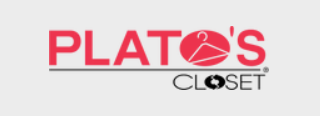Champion of Clothing Reuse
Plato’s Closet

At a time when money is tight for residents across Canada, getting cash back for your unwanted used clothing has never been sweeter.
Plato’s Closet is here to help you unlock the value of your textiles while keeping them in use.
You may already be familiar with Plato’s Closet, a consignment-like clothing store chain present in many major cities across Canada. But did you know they’re an active part of the Canadian circular economy? Selling secondhand clothes with a “teen and 20-somethings” vibe, customers can shop beloved brand names while keeping pre-loved items in use.
Plato’s Closet is owned by parent company Winmark, whose mission is to keep useful goods out of the landfill, put money back into the pockets of local communities, and extend the life cycle of items. It has a huge international impact with approximately 40 locations in Canada alone, with stores across British Columbia, Alberta, Manitoba, Saskatchewan, Ontario, New Brunswick, and Nova Scotia. Winmark also owns several other secondhand store brands like Once Upon a Child, Play It Again Sports, and others, making the multi-brand company a circular economy champion with a huge impact.
The Share Reuse Repair Hub team sat down with Robyn Cussen, the manager of three Ontario-based locations—Vaughan, Brampton, and Mississauga West — who grew up frugal, with recycling, upcycling, and composting as common practices within her family. When asked about the circular economy, Robyn stated how Plato’s Closet thinks of it. “We call [the circular economy] the buyer-archy of needs,” she explained. “What can you do before you buy something new? Can you repair it? Can you re-wear it? Can you reuse it? Can you repurpose it? Can you lend it to a friend? Can you borrow from a friend before you buy and create something new? […] How many ways can you use something before it reaches the end of its life cycle?”
Customers are encouraged to bring in items that are then assessed for purchase from a buyer. Notably, if the item is accepted, cash—up to 30-40% of the market value of the item—is given to the client on the spot, which differs from a traditional consignment process where the item must be sold before the donor receives money. If the item doesn’t meet the style guidelines for Plato’s Closet ideal products, the buyer refers the donor to other places where their items may be accepted. Each local community with a Plato’s Closet location receives back on average $400,000 through this unique model of consignment, keeping local economies strong.
Examples like Plato’s Closet highlight how economically feasible the circular economy can be as a business model. “No franchise owner would be able to open more stores if there wasn’t a demand for it,” says Robyn.
Robyn anticipates opportunities to address age gaps and size gaps that exist between Winmark’s brands to increase the amount of clothing kept in use. “I want to keep all things in circulation. I want them to find a home when they’re in good condition. [We would love to host workshops to increase] accessibility [of] good quality items for people, especially in this time where money is very tight, we’re in a lot of uncertainty; making sure people have those needs covered.”
Reflecting back on her ten years of experience with the brand, and how their protocols have evolved to increase the amount of textiles kept in use, her advice to businesses adopting circular practices is this: “You have to be okay with failure and you have to be okay with learning. You’re not going to do it the first time. Try things. If they don’t work, try another method. When there’s no try, there’s no succeed. It’s totally okay to have room for improvement.”
Find local Plato’s Closet locations on the Share Reuse Repair Hub directory!
Contribute to the Hub
Know of a resource, local business, or event that supports share, reuse, or repair that we should know about? Let us know by filling out the form at the link below.
